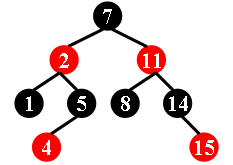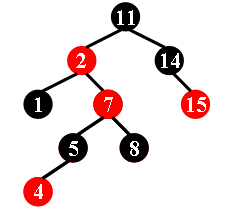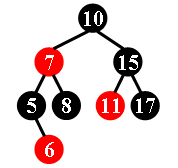1135 Is It A Red-Black Tree (30分)
There is a kind of balanced binary search tree named red-black tree in the data structure. It has the following 5 properties:
- (1) Every node is either red or black.
- (2) The root is black.
- (3) Every leaf (NULL) is black.
- (4) If a node is red, then both its children are black.
- (5) For each node, all simple paths from the node to descendant leaves contain the same number of black nodes.
For example, the tree in Figure 1 is a red-black tree, while the ones in Figure 2 and 3 are not.



For each given binary search tree, you are supposed to tell if it is a legal red-black tree.
Input Specification:
Each input file contains several test cases. The first line gives a positive integer K (≤30) which is the total number of cases. For each case, the first line gives a positive integer N (≤30), the total number of nodes in the binary tree. The second line gives the preorder traversal sequence of the tree. While all the keys in a tree are positive integers, we use negative signs to represent red nodes. All the numbers in a line are separated by a space. The sample input cases correspond to the trees shown in Figure 1, 2 and 3.
Output Specification:
For each test case, print in a line "Yes" if the given tree is a red-black tree, or "No" if not.
Sample Input:
3 9 7 -2 1 5 -4 -11 8 14 -15 9 11 -2 1 -7 5 -4 8 14 -15 8 10 -7 5 -6 8 15 -11 17
Sample Output:
Yes
No
No
题意:判断一颗给定的树是否是红黑树,红黑树需要满足以下条件:
1.每个结点要么是红色要么是黑色
2.根节点是黑色的
3.每个叶子结点是黑色的。红黑树里面的叶子结点表示的是最下层的空结点
4.如果一个结点是红色的,那么它的两个孩子结点都是黑的。
5.从每一个结点出发,到任意叶子节点的简单路径上所包含的黑色结点个数相同。
思路:题目给定了前序遍历序列,需要注意的是红黑树是一个特殊的二叉排序树,它也符合左子树的值<根结点的值<右子树的值 的特点,因此可以根据前序遍历建立一颗二叉查找树,然后判断这颗树是否为红黑树。
代码如下:
#include<cstdio> #include<cstdlib> #include<math.h> #include<vector> using namespace std; typedef struct node{ int val; node* l; node* r; }node; void judge2(node* root,int& mark){ if(root->val<0){ if(root->l!=NULL){ if(root->l->val<0){ mark=0; } } if(root->r!=NULL){ if(root->r->val<0) mark=0; } } if(root->l!=NULL){ judge2(root->l,mark); } } void judge3(node* root,int count,vector<int> &v){ if(root==NULL){ v.push_back(count); } else{ if(root->val>=0) count++; judge3(root->l,count,v); judge3(root->r,count,v); } } void judge(node* root){ if(root->val<0){ printf("No "); return; } int mark=1; judge2(root,mark); if(mark==0){ printf("No "); return; } int count=0; vector<int> v; judge3(root,count,v); int sum=v[0]; for(vector<int>::iterator it=v.begin();it!=v.end();it++){ if(*it!=sum){ printf("No "); return; } } printf("Yes "); return; } node* build(node* root,int val){ if(root==NULL){ root =(node*)malloc(sizeof(node)); root->val=val; root->l=NULL; root->r=NULL; root; } else if(abs(val)<=abs(root->val)){ root->l=build(root->l,val); } else root->r=build(root->r,val); return root; } int main(){ int n,num,temp; scanf("%d",&n); for(int i=0;i<n;i++){ node* root=NULL; scanf("%d",&num); for(int j=0;j<num;j++){ scanf("%d",&temp); root=build(root,temp); } judge(root); } return 0; }